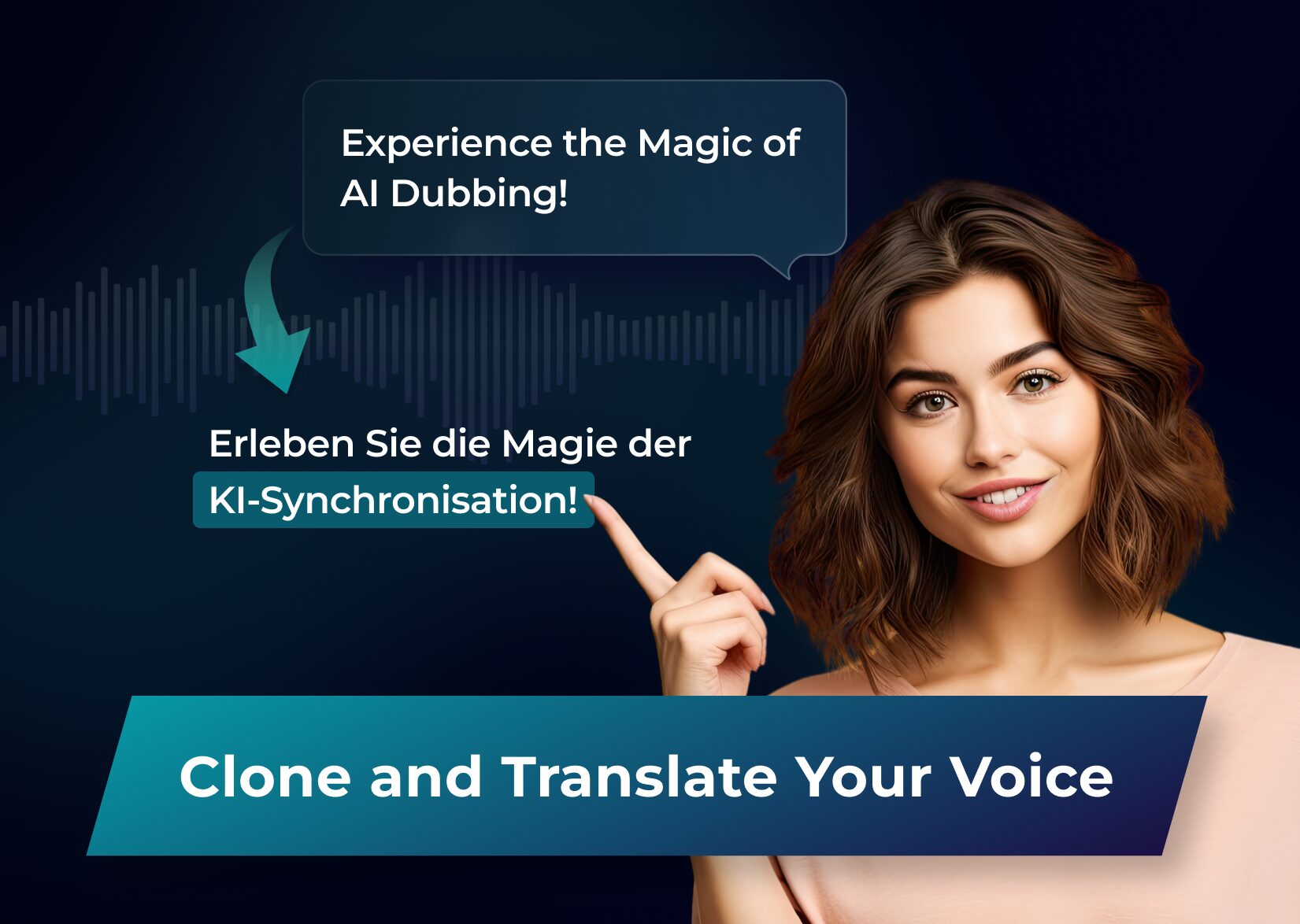AI Video Dubbing: How Does It Really Work?

The world is evolving at such a speed that we don’t even need to learn a foreign language: the mighty AI can do it for you! Just a few clicks, and wow, your video-self is speaking French, Spanish, or any other language you’ve always wanted to know. But, wait, how is AI actually capable of doing the magic? Let’s learn about the technologies involved in the process and the capabilities of a modern AI dubbing tool.
The AI dubbing process explained
Under the hood of traditional dubbing tools, there’s artificial intelligence (AI) and its subsets working. First, AI’s natural language processing (NLP) and neural networks process the words you pronounce and determine your voice pitch, timbre peculiarities, and speed of speaking. Then AI translates your words into a target language, voices the translated texts, and applies them to a video.
To be able to do this, the tool engages AI’s deep learning ability, which allows it to consume and process large volumes of data and, hence, learn through it. As AI knows the exact equivalents of your words in multiple languages and quickly analyzes your voice patterns, the dubbed version of your video will be of the same quality as the original.
So, how can I dub videos online?
We’ve made the process of dubbing extremely easy. In Captions, it just takes 3 steps:
- Upload the video to Captions.
- Choose one language for your dubbed video.
- Wait a few seconds for Captions to precisely clone your voice, intonations, and pitch from the original audio, and then download the dubbed video back to your device.
What will I get from AI voice dubbing into multiple languages?
Cost-effective voice-over
If before, you had to hire native speakers to voice over your videos, AI dubbing technology allows you to do it all by yourself. Imagine how much you would spend to first translate your audio content and then voice it over. Basically, by using an online dubbing tool, you will receive high-quality dubbing almost immediately, so you don’t waste days and weeks waiting for the right voice actors and translators to do their job.
Also, what if you want to have dubbed videos in more languages? Then you would need to find a lot of people and coordinate their work! In this case, an online dubbing tool is certainly a game-changer for those who need to create high-quality content with little money and time.
International audiences
Instead of targeting only those who know English, why not engage everyone to be a part of your follower list? Via AI tools, you can dub your video content in multiple languages simultaneously. This way, you can be sure your message is conveyed to a wider audience who will hear you in their native languages. This builds up your respect and popularity all around the world.
Voice consistency
Compared to traditional dubbing methods, AI enables the video to speak with your own voice but in a different language. If before you had to hire several dubbing actors, all with different voices and styles of talking, today you simply upload a video and end up with natural-sounding videos to not confuse your global audience.
Scalability and speed
One of the most significant advantages of AI dubbing is the ability to scale quickly. Traditional dubbing processes can be time-consuming, involving numerous steps from translation to recording to syncing. AI dubbing, on the other hand, automates these steps, dramatically reducing the turnaround time.
Whether you need to dub a single video or an entire series, AI can handle the workload efficiently, producing consistent results in a short time. This means faster go-to-market times for content creators and businesses, enabling them to reach global audiences more swiftly.
AI dubbing tools: what features to expect?
Modern tools should be capable of much more than just copying and recognizing human voices. For example, Captions uses advanced AI technology to provide a whole set of features for creating videos, from recording to posting them across social media. Here’s what Captions can do aside from real-time dubbing:
Video subtitling
Captions can automatically generate accurate subtitles for your videos to make your content accessible and boost engagement. This feature ensures that your videos reach a wider audience, including those who are hearing impaired or prefer to watch videos with the sound off.
Now, you don’t need to manually insert all the words you’ve pronounced. Instead, you can introduce several tweaks, if needed, to the auto-generated subtitles. This will immediately boost your engagement, as your audience won’t quickly swipe your video, as they can read it now!
Translation of subtitles
Our multilingual tool can diversify your content by both translating its subtitles and voicing your videos over. So, choose one or several of the 100+ languages available in Captions and enjoy the inflow of international audiences.
Video script generation
Creating a compelling video script can be time-consuming, and, as video creators, we know it through practice. Luckily, AI can help with it too. Choose the preferred length of your video, its target audience, and the style of narration, and give AI a couple of hints about what you want the video to be about (it can be just one word!). Based on it, Captions will create a cool ironic dialogue for adults or a short fairytale for children. Of course, then you can modify it however you want and paste it to…
Teleprompter
Right, we took care of it as well and made it possible for you to read the script from the screen while recording. Adjust the speed of its appearance and finally forget about the need to memorize the whole narration from word to word.
Video compressing
This feature enables you to compress your videos without quality loss, making your files easier to share and quicker to upload. Captions support all video formats, including GIF and MP4. Here, you can also compress videos for TikTok, YouTube, and other social media platforms.
Should I try AI dubbing?
If you want to reach a larger audience in no time without spending a large sum, then the answer is yes. You can always go back to the old-school way and hire professional voice-over actors to dub your videos. But be prepared: it takes much more time, effort, and, of course, money.
If you decide to go for an AI tool to create dubbed videos, don’t forget to check if it has all the necessary features for content creation. Such tools as Captions are packed with a whole set of video production features so that you don’t jump from app to app but conveniently record, edit, subtitle, and dub your video with a human voice in one place.
FAQ
Can AI dub a video?
Yes, such AI’s subsets as natural language processing, neural networks, and deep learning allow it to dub over videos in different languages and different voices. Such tools as Captions are fed with enormous amounts of audio and textual data to be able to precisely reproduce a spoken language.
What is the best AI-dubbing tool?
Some need only an audio dubbing feature from an app, while others require a whole set of video production tools inside one program. So, the choice depends on your preferences and workflow. Try out Captions as it serves both purposes: use only its AI voice generation feature or feel free to record and edit your videos together with our smart AI.
More articles

150+ Best Vacation Instagram Captions to Make Your Travel Photos Pop
Planning your dream vacation is exciting, but finding the perfect words to accompany those stunning photos can be challenging. Whether you’re lounging on a tropical beach, exploring ancient ruins, or hiking breathtaking mountains, the right caption can elevate your Instagram post from ordinary to unforgettable. You’ve packed your bags for the family vacation, created memories, […]

175+ Unforgettable Prom Instagram Captions to Make Your Night Shine | 2025 Edition
Capturing the magic of prom night on Instagram requires more than just stunning photos – you need the perfect caption to complete your post. Whether you’re looking for something sentimental, funny, referencing your favorite song lyrics, or the photos from the dance floor, the right words can make your prom memories shine even brighter on […]

200+ Beach Instagram Captions: From Funny to Inspirational Quotes
Looking for the perfect words to pair with your beach photos? You’re not alone. A day at the shore isn’t truly complete until you’ve captured those sun-soaked moments and shared them with a caption that perfectly complements your vibe. Whether you’re posting golden hour selfies, documenting beach games, or showcasing those “sunkissed nose, sandy toes” […]